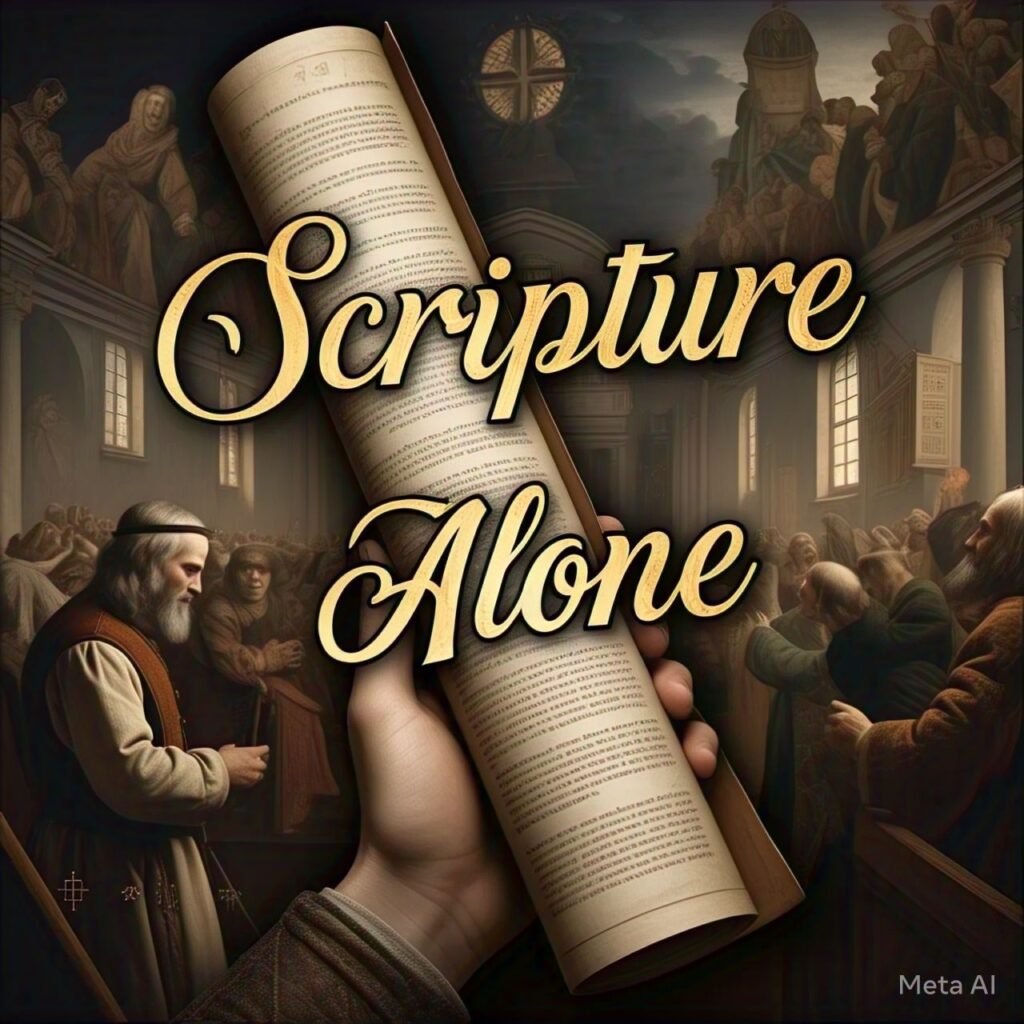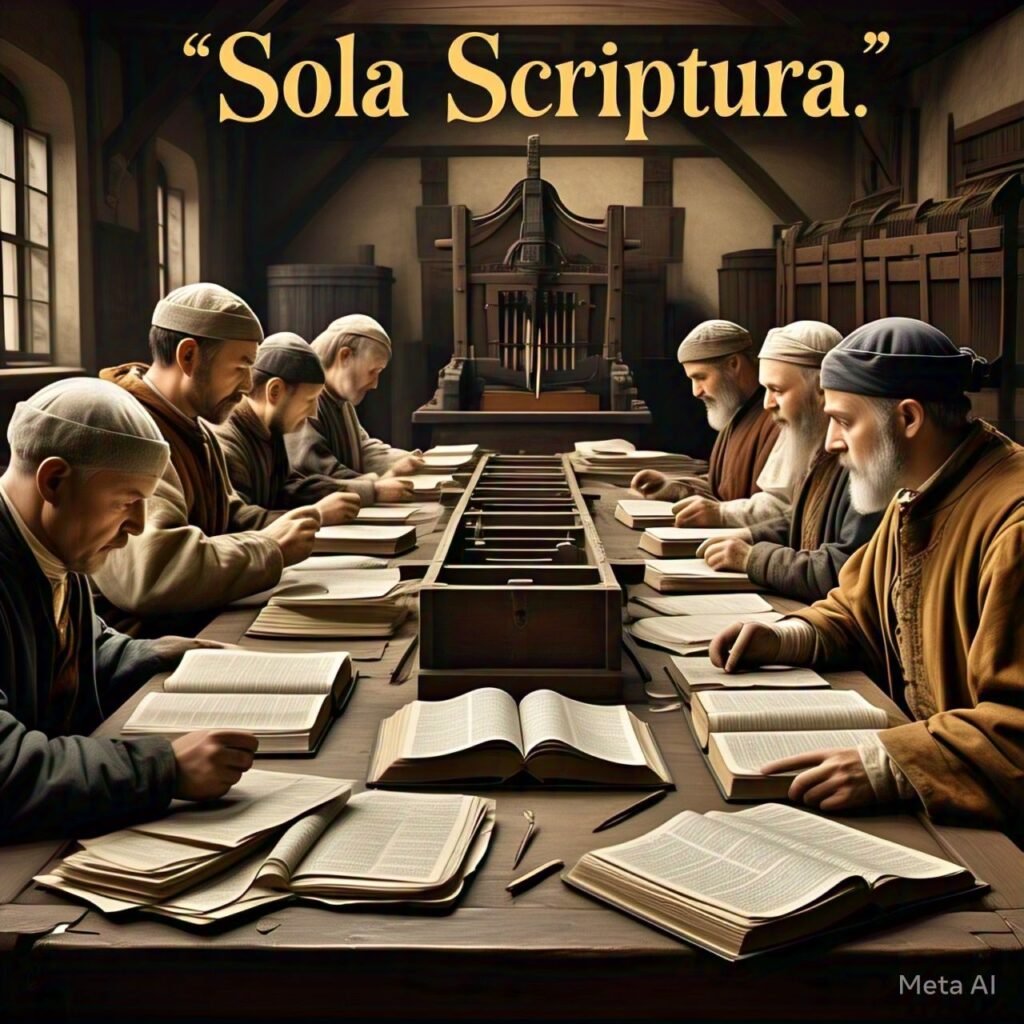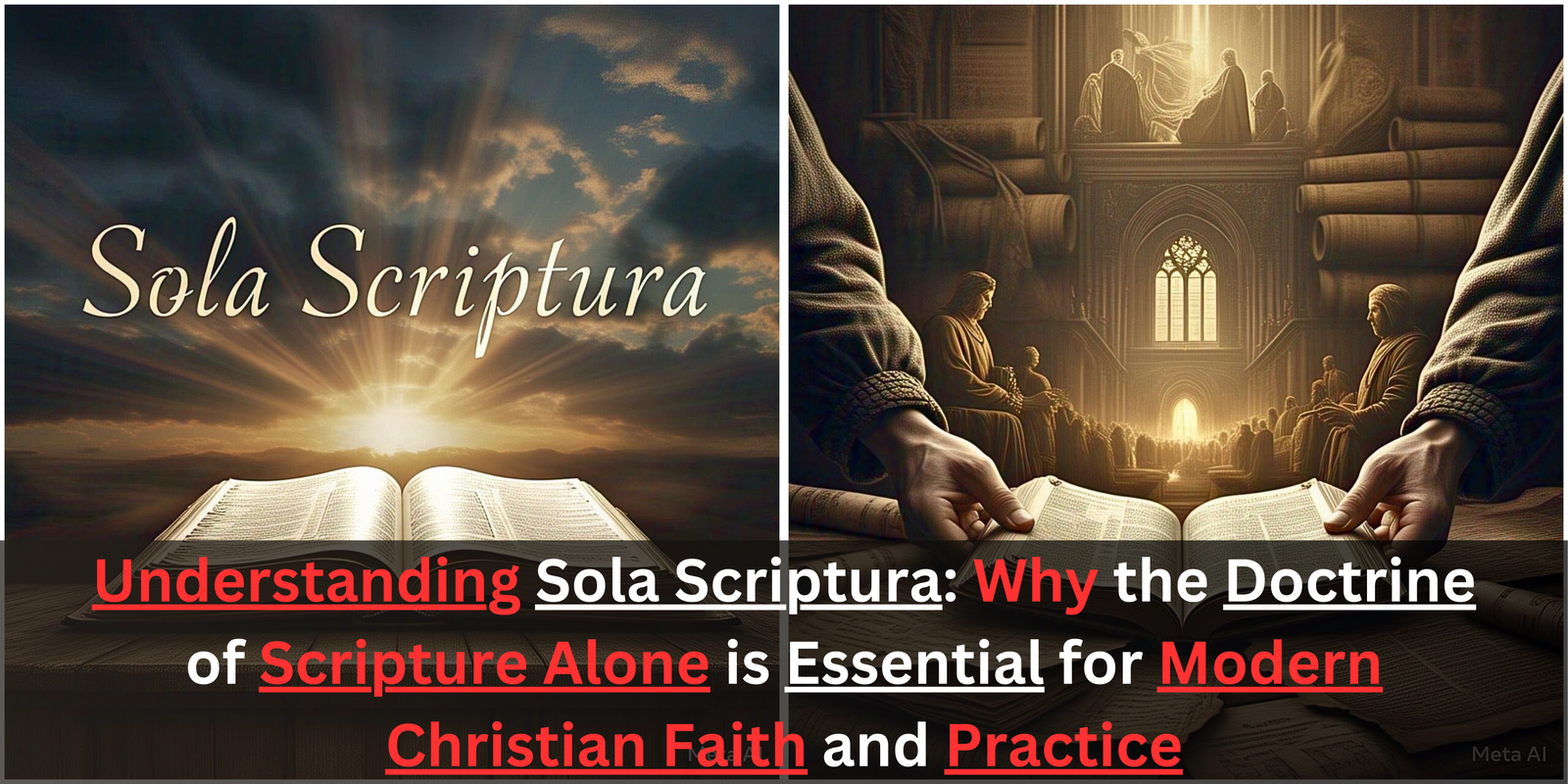
Introduction to Sola Scriptura
Sola Scriptura, a Latin term meaning “Scripture alone,” stands as one of the central tenets of Protestant Christianity. Emerging during the Reformation in the 16th century, this doctrine asserts that the Bible is the ultimate authority in all matters of faith and practice. In essence, Sola Scriptura maintains that all necessary truth for salvation and Christian living is found within the pages of the Bible, and no other authority—whether tradition, church leadership, or personal experience—can supersede its role. This concept has profound implications for modern Christian life, influencing everything from personal devotions to the collective practices of the church.
The Sola Scriptura doctrine—”Scripture alone”—is a central tenant that has influenced the course of Christian history and is still of deep importance to believers today. Based in the Protestant Reformation, Sola Scriptura teaches that the Bible is the final and ultimate authority in matters of faith and practice, above and apart from any tradition, ecclesiastical decision, or human interpretation.

In an age where words from every direction provide rival teachings, this teaching is a precious bulwark, keeping the Church rooted in the immutable truths of God’s Word. The Reformation’s call to “return to the Scriptures” repudiated the increasing power of church traditions that had blotted out the plain doctrine of the Bible, turning Christian practice again to its origin in God’s revealed Word.
In this day and age when various interpretations, cultural demands, and changes in doctrine are so prevalent, Sola Scriptura is the Christians’ ageless anchor, protecting them from error and serving to clarify when there is confusion. By highlighting that Scripture alone is enough to bring one to salvation and sanctification, Sola Scriptura equips believers to live obediently, assured that the Bible is the ultimate authority to which every belief and practice must be brought.
In this article, we will discuss why Sola Scriptura is not only necessary for doctrinal integrity but is a vital principle for the faithful exercise of Christianity in today’s world. By maintaining the Bible as the only authority, Sola Scriptura guarantees that the gospel will not be changed and that believers can have confidence in following their faith according to God’s truth.
Historical Context of Sola Scriptura
The roots of Sola Scriptura trace back to the early church and are reflected in the writings of church fathers like Augustine and Jerome. However, the doctrine was most prominently articulated during the Protestant Reformation by figures such as Martin Luther and John Calvin. Luther, in particular, famously rejected the authority of the Catholic Church and its traditions that were not grounded in Scripture. His belief in the supreme authority of Scripture was formalized in his doctrine of sola scriptura. This was a clear protest against the Church’s addition of human-made doctrines, such as indulgences and papal authority, which were not found in the Bible.
The Reformation brought into sharp relief the tensions between Scripture and ecclesiastical authority. The Catholic Church, during that period, upheld both Scripture and Tradition as co-equal sources of authority. However, reformers argued that any teaching or practice not explicitly supported by the Bible was invalid. This marked the beginning of a return to the Bible as the final arbiter of all theological disputes, paving the way for the widespread adoption of Sola Scriptura across Protestant denominations.
The Biblical Foundation for Sola Scriptura
The Bible itself provides the theological foundation for Sola Scriptura. In 2 Timothy 3:16-17, the Apostle Paul writes, “All Scripture is God-breathed and is useful for teaching, rebuking, correcting, and training in righteousness, so that the servant of God may be thoroughly equipped for every good work.” This passage underscores the sufficiency of Scripture, which, according to Sola Scriptura, is all that a believer needs to live a godly life. The Bible is described as divinely inspired and complete, leaving no room for additional authoritative sources of revelation.
Furthermore, in Acts 17:11, the Berean Jews are commended for their noble character because they “examined the Scriptures every day to see if what Paul said was true.” This passage reflects the early church’s reliance on Scripture as the final authority, even when teachings came from an apostle. The principle of Sola Scriptura thus finds its roots in Scripture itself, which is why it is regarded as the cornerstone of Reformed theology.
The Role of Scripture in Modern Christian Life
In the context of modern Christianity, Sola Scriptura remains essential for guiding personal faith and practice. Today, many Christians turn to the Bible for direction in their spiritual journey. Whether in the midst of personal struggles or making ethical decisions, believers rely on the Scriptures as their ultimate source of guidance. The doctrine of Sola Scriptura ensures that Scripture is not only foundational but also supreme in matters of doctrine, morality, and Christian living.

Sola Scriptura leads Christians to embrace the Bible as the primary means through which God speaks to His people. This allows individuals to form their convictions based solely on Scripture rather than relying on external authorities such as church councils, charismatic leaders, or subjective experiences. For example, when making decisions about marriage, finances, or even political beliefs, many modern Christians look first to the Scriptures for wisdom. Sola Scriptura empowers believers to interpret and apply the Bible in ways that align with the original intent of the biblical writers.
Sola Scriptura and Church Practice
The doctrine of Sola Scriptura also profoundly affects the way churches structure their practices and doctrines. Protestant denominations, particularly those rooted in Reformed and Evangelical traditions, emphasize preaching and teaching from the Bible as central to worship. Unlike some branches of Christianity, where tradition or liturgical practices may hold equal weight to Scripture, Sola Scriptura ensures that the Bible remains the sole authoritative guide for Christian worship and practice.

The Protestant principle of sola scriptura is also evident in the way churches approach doctrinal debates. For example, the debate over the nature of baptism, salvation, and the Eucharist within Protestantism often hinges on careful exegesis of Scripture. The doctrine of Sola Scriptura upholds that any theological position must be firmly rooted in the Bible to be considered valid. It also encourages churches to remain vigilant in the pursuit of biblical truth, even when facing pressures from secular culture or internal divisions.
Sola Scriptura and the Authority of the Church
One of the key elements of Sola Scriptura is its stance on the authority of the Church. According to the doctrine, the Church does not have the authority to alter or add to the teachings of Scripture. While the Church plays a crucial role in preaching, teaching, and shepherding the flock, its authority is derivative, not absolute. This is a stark contrast to the Roman Catholic view, where the Pope and Church tradition are seen as sources of equal authority alongside Scripture.
The idea of Sola Scriptura places the Bible above the authority of church leaders, ensuring that any teachings or traditions that contradict Scripture are subject to correction. This doctrine also implies that the Church should constantly evaluate its practices and beliefs against the Word of God. When the Church deviates from biblical truth, it is the responsibility of believers to return to Scripture for correction. In this sense, Sola Scriptura is a safeguard against the distortion of Christian faith by human authorities.
The Importance of Sola Scriptura in the Age of Relativism
In today’s world, where truth is often seen as subjective and relativistic, Sola Scriptura offers a refreshing and unwavering source of authority. In an age where personal experience, cultural norms, and shifting societal values can dictate moral standards, the doctrine of Sola Scriptura reminds believers that there is an objective, timeless truth found in the Bible. This truth does not change with the tides of public opinion or the latest cultural trends. For modern Christians, Sola Scriptura provides a rock-solid foundation upon which they can stand, especially when facing the pressures of secularism and moral relativism.
Moreover, Sola Scriptura equips Christians to navigate the complexities of modern life with biblical discernment. In a time when new ideologies and theological movements constantly emerge, Sola Scriptura remains a reliable guide, protecting believers from error and leading them back to the fundamental truths of the Christian faith. The Bible, in the doctrine of Sola Scriptura, stands as the final arbiter on all matters of faith and conduct, offering clarity in a world that often seems clouded by confusion.
Sola Scriptura and Personal Faith
On a personal level, Sola Scriptura encourages Christians to develop a deeper relationship with the Bible, fostering a more robust personal faith. By emphasizing the sufficiency and authority of Scripture, it calls believers to read, study, and meditate on God’s Word regularly. It also empowers Christians to approach the Bible with confidence, knowing that it is God’s perfect revelation for their lives.

Many modern Christians find themselves increasingly relying on Scripture to guide them through life’s challenges. Whether in times of suffering, joy, or confusion, the Bible remains a constant source of comfort, direction, and truth. The doctrine of Sola Scriptura ensures that every believer, regardless of their social or intellectual background, has access to the wisdom of God’s Word and can confidently trust in its sufficiency for their spiritual growth.
The Role of Sola Scriptura in Christian Doctrine
Sola Scriptura plays a pivotal role in shaping the core doctrines of Christianity, as it serves as the foundational authority for all theological beliefs. One of the significant aspects of this doctrine is that it directs all Christian teachings back to the Bible. The early church fathers emphasized Scripture’s role in informing key doctrines, and the Protestant Reformation reasserted the necessity of the Bible as the standard against which all other theological claims must be evaluated. Without Sola Scriptura, the risk arises that traditions and teachings could diverge from the original apostolic faith, leading to distortion and misinterpretation of the gospel message.
The doctrine of Sola Scriptura also ensures that core Christian teachings such as salvation by grace through faith, the nature of the Trinity, and the incarnation of Christ are derived directly from Scripture. It helps safeguard the gospel from being overshadowed by human traditions or church edicts that might stray from biblical truth. For example, the biblical doctrine of salvation, which emphasizes faith in Christ alone, stands in direct contrast to any practice that suggests salvation can be earned through works or indulgences. Sola Scriptura upholds the pure teachings of Scripture, offering clarity and consistency in theological matters.
The Relationship Between Tradition and Scripture
While Sola Scriptura asserts that Scripture alone is the ultimate authority, it does not necessarily dismiss the role of tradition entirely. The Reformation’s doctrine of Sola Scriptura must be understood in the context of how tradition relates to Scripture. The Reformers acknowledged that the early church’s traditions and practices were not inherently flawed but must always be subject to the authority of Scripture. In other words, while traditions can be useful for understanding and applying biblical truths, they cannot replace or add to the Bible.
The Roman Catholic Church, in contrast, holds to the idea of a dual authority—both Scripture and Sacred Tradition—as sources of revelation. In this view, the Church’s authority is seen as being complementary to the Bible, where the Church, guided by the Holy Spirit, interprets Scripture and maintains the integrity of the gospel message. However, the doctrine of Sola Scriptura rejects this view, emphasizing that any tradition or teaching that is not explicitly supported by Scripture should be discarded. This leads to a more direct relationship between the individual believer and the Word of God, making Scripture the final arbiter in all theological matters.
The Accessibility of Scripture
One of the central tenets of Sola Scriptura is the belief that the Bible is accessible to all believers. By affirming the doctrine of sola scriptura, the Reformers emphasized the importance of Scripture being available in the vernacular languages of the people. Before the Reformation, the Bible was primarily available in Latin, a language that only the educated clergy could understand. Reformers like Luther and Tyndale worked tirelessly to translate the Bible into languages that common people could read and comprehend, promoting the idea that Scripture should not be confined to a select few but should be available to every believer.

This accessibility of Scripture not only democratizes religious knowledge but also places the responsibility for personal interpretation and understanding directly on the shoulders of individual Christians. Under the doctrine of Sola Scriptura, every believer is encouraged to read, study, and interpret the Bible for themselves, relying on the Holy Spirit to guide them into all truth. The proliferation of Bible translations and the rise of personal Bible study are testaments to the enduring relevance of this principle.
Sola Scriptura and the Church’s Mission
Sola Scriptura also influences the mission of the Church in the modern world. The gospel message is encapsulated within the pages of Scripture, and the Church’s mission is to spread this Word to all nations. By emphasizing the sufficiency of Scripture, Sola Scriptura ensures that the Church’s teachings are firmly rooted in the Bible, not in subjective experiences or external philosophies. This alignment with Scripture strengthens the Church’s witness to the world, as the gospel message is communicated with clarity and conviction.
In practical terms, Sola Scriptura impacts how the Church engages in evangelism and discipleship. The focus on Scripture as the primary source of truth means that evangelistic efforts are centered on preaching the Word and teaching others to obey everything Christ has commanded. Churches that uphold Sola Scriptura are committed to preaching Scripture faithfully, without altering or watering down its message to accommodate popular culture or societal pressures.
The Role of Exegesis and Hermeneutics in Sola Scriptura
Exegesis, the careful interpretation and exposition of Scripture, plays a vital role in upholding Sola Scriptura. Proper biblical exegesis ensures that the text is understood in its historical, cultural, and literary context, allowing for accurate interpretation. Hermeneutics, the theory and methodology of interpretation, also becomes crucial in this context. For Sola Scriptura to be effective, it requires believers to not only read the Bible but to interpret it correctly, avoiding the dangers of proof-texting or cherry-picking verses out of context.
The doctrine of Sola Scriptura also encourages a high view of Scripture, where every word in the Bible is regarded as divinely inspired and authoritative. Therefore, engaging in careful exegesis is not just an academic exercise but a spiritual discipline. It ensures that the Bible’s teachings are accurately communicated and applied in the life of the Church and the believer. As believers engage with Scripture, they are called to avoid eisegesis—reading into the text preconceived ideas or personal biases—and instead let the Bible speak for itself.
Sola Scriptura and the Christian’s Authority to Interpret Scripture
A key feature of Sola Scriptura is the belief that every Christian has the authority and responsibility to interpret the Bible. Unlike some traditions that place the authority of Scripture solely in the hands of a clerical class or denominational leaders, Sola Scriptura asserts that all believers are equipped to study and understand God’s Word. This is grounded in passages such as 1 Peter 2:9, where the apostle Peter refers to Christians as “a royal priesthood,” signifying that all believers have access to God and His revelation through Scripture.

This doctrine empowers Christians to interpret the Bible for themselves and to apply its truths to their daily lives. It fosters a deep sense of personal responsibility, where believers are encouraged to engage with Scripture regularly and not to rely solely on the interpretations of others. While the Church and its leaders may provide helpful guidance and teaching, the ultimate responsibility for understanding the Bible lies with each individual Christian, guided by the Holy Spirit.
The Impact of Sola Scriptura on Christian Unity
While the doctrine of Sola Scriptura emphasizes the authority of the Bible, it also calls for unity within the Christian faith. The Bible itself encourages believers to be of one mind and to pursue unity in Christ. However, the diversity of interpretations of Scripture has sometimes led to denominational fragmentation, as various groups emphasize different theological points. While Sola Scriptura encourages individual interpretation, it also emphasizes the need for the Church to engage in corporate study and dialogue about Scripture to maintain unity in the essentials of the faith.
Denominational differences, while significant, should not divide Christians on the core doctrines of salvation, the nature of God, or the person of Christ. Sola Scriptura provides a foundation for Christian unity by pointing believers back to the Bible as the source of truth. Differences in interpretation should be addressed in light of Scripture’s authority, with the goal of maintaining fidelity to the biblical message and promoting peace among believers.
Sola Scriptura and Contemporary Issues
The doctrine of Sola Scriptura continues to have a profound influence on how Christians engage with contemporary issues. Whether dealing with ethical dilemmas, social justice, or theological controversies, the Bible remains the final authority for addressing these challenges. Modern Christians must navigate a rapidly changing world, but the doctrine of Sola Scriptura provides them with a stable, unchanging guide that is relevant in every era.
In issues such as marriage, gender identity, and bioethics, the Bible offers clear moral teachings that Christians believe should inform their responses to these issues. While society may offer alternative views or opinions, Sola Scriptura encourages believers to look to Scripture first and foremost to discern God’s will. This is especially critical in a culture that often promotes relativism and situational ethics, where moral standards are seen as fluid. Sola Scriptura, however, affirms the Bible’s unchanging truth, calling Christians to stand firm in the faith.
Sola Scriptura and Personal Transformation
At its core, Sola Scriptura is not just a doctrine for theological or ecclesiastical debate—it is also a path to personal transformation. For the believer who adheres to Sola Scriptura, the Bible is not simply a book to be studied but a tool for spiritual formation and growth. It provides divine wisdom and guidance, shaping how individuals live out their Christian faith. As believers regularly immerse themselves in the Scriptures, they are challenged to live in accordance with the Word of God, allowing it to mold their thoughts, attitudes, and actions.

The Bible, in the doctrine of Sola Scriptura, is not static or theoretical but is living and active, as Hebrews 4:12 affirms. It is through Scripture that Christians can undergo the renewing of their minds, as Paul exhorts in Romans 12:2. The principles of Sola Scriptura encourage Christians to not merely read the Bible as an academic exercise but to let it deeply influence their lives. Through consistent engagement with Scripture, believers experience the transformative power of God’s Word, leading them toward greater sanctification and Christlikeness.
Sola Scriptura and the Authority of Preaching
Preaching holds a prominent place within Christian practice, particularly for those who uphold the doctrine of Sola Scriptura. Preaching, rooted in Scripture, is viewed as the primary means by which the church communicates God’s Word to the congregation. The Reformation emphasized the centrality of biblical preaching, seeing it as a vital means of discipleship and evangelism. The authority of the preacher is not inherent in their personal charisma, education, or experience but is derived entirely from the Scripture that they expound upon.
In Protestant traditions, the pulpit becomes the place where the Scriptures are faithfully proclaimed, not where human opinions or speculative ideas take precedence. Preachers who adhere to Sola Scriptura recognize their responsibility to faithfully communicate what the Bible teaches, rather than offering their own opinions or relying on cultural trends. This reliance on the Bible as the final authority in preaching ensures that the message heard from the pulpit remains grounded in truth and that the congregation receives teaching that aligns with the gospel.
Sola Scriptura and the Christian’s Relationship to the World
Another significant aspect of Sola Scriptura is its influence on how Christians engage with the world around them. The Bible provides not only spiritual guidance but also practical wisdom for living in a fallen world. The doctrine of Sola Scriptura teaches that Christians should seek to apply the truths of Scripture to every area of life—whether in politics, education, economics, or relationships. While the world may offer its own systems of thought and ethical frameworks, Sola Scriptura calls believers to evaluate these in light of God’s Word.

In a society that often prioritizes secular ideologies or human-centered philosophies, Sola Scriptura offers a distinctly Christian worldview. This worldview, grounded in the Bible, informs how Christians approach issues such as justice, human dignity, and the sanctity of life. For example, the Bible teaches the inherent value of every human being as made in the image of God, which shapes how Christians engage with social issues like poverty, racism, and human trafficking. By adhering to Sola Scriptura, believers are called to challenge the norms of society and remain faithful to biblical truths, regardless of popular opinion.
The Sufficiency of Scripture in Addressing Modern Challenges
In the face of modern challenges, Sola Scriptura asserts that Scripture remains sufficient for navigating contemporary issues. This sufficiency principle contends that the Bible, while not a comprehensive manual for every modern problem, contains all the necessary revelation needed to live faithfully and make sound decisions. From questions of ethics to debates about personal identity, the Bible provides timeless truths that are applicable to every generation.
For instance, in the debate over bioethics, particularly regarding topics such as abortion, euthanasia, and genetic modification, Christians who uphold Sola Scriptura turn to the Bible for guidance on the sanctity of life. In the context of marriage and family life, Scripture offers clear instructions on God’s design for relationships and sexual ethics, providing believers with a standard by which to live. While the cultural context may have changed dramatically since the biblical era, the truths of Scripture remain relevant and applicable in addressing these pressing issues.
Furthermore, Sola Scriptura helps believers resist the pull of cultural relativism, where moral standards are often seen as subjective and fluid. In a world where values are often determined by popular opinion or shifting trends, Sola Scriptura offers an unchanging and trustworthy foundation. For modern Christians, this principle allows them to confidently engage with a secular world, knowing that God’s Word speaks to the heart of the most urgent ethical and moral questions.
Sola Scriptura and Christian Liberty
Christian liberty, an essential doctrine in Protestant theology, is also closely tied to the principle of Sola Scriptura. The Bible teaches that believers are free from the constraints of legalism and man-made traditions that were once imposed upon them by the law or ecclesiastical authorities. Galatians 5:1 famously declares, “It is for freedom that Christ has set us free. Stand firm, then, and do not let yourselves be burdened again by a yoke of slavery.”
For those who adhere to Sola Scriptura, Christian liberty means that Scripture is the only authority that can dictate a believer’s actions. Human traditions, cultural expectations, or church laws that do not align with the Bible should not hold sway over a Christian’s conscience. This freedom, however, does not promote an antinomian or lawless lifestyle but rather encourages believers to live according to the moral law of God as revealed in Scripture.
Christian liberty under Sola Scriptura also means that individuals have the freedom to read and interpret the Bible for themselves. This stands in stark contrast to the tradition of medieval Catholicism, where access to the Bible was restricted and interpretation was controlled by the clergy. Sola Scriptura democratizes the study of Scripture, empowering every believer to seek God’s truth for themselves and to live according to what they understand from the Bible.
Sola Scriptura and the Perils of Human Innovation in Doctrine
One of the dangers of departing from Sola Scriptura is the risk of human innovation in doctrine, which can lead to the distortion of the Christian faith. As the history of the Church demonstrates, whenever human authorities or traditions are allowed to supplant Scripture as the final authority, new doctrines and practices arise that can deviate from the apostolic faith. This innovation can take many forms—whether in the form of new theological systems, esoteric teachings, or misguided moralities that do not reflect the clear teachings of Scripture.

In the modern context, we often see this in the rise of so-called “new revelations” or movements within Christianity that claim to possess fresh insights or spiritual experiences that are not grounded in the Bible. These innovations can lead believers away from the simplicity and purity of the gospel message. Sola Scriptura acts as a safeguard against such trends, ensuring that any new teaching or movement is tested against the unchanging truth of Scripture. This protection is essential for maintaining the integrity of Christian doctrine and practice, keeping believers anchored in the foundational truths of the faith.
Sola Scriptura and the Church’s Sacramental Life
Sola Scriptura also influences the Church’s understanding and practice of the sacraments. In Protestant traditions, particularly those that uphold the doctrine of Sola Scriptura, the sacraments—such as baptism and the Lord’s Supper—are viewed as means of grace that are instituted directly by Scripture. The Reformers argued that these practices should be carried out according to the commands of Christ in the New Testament, and any additions or alterations to their practice that are not grounded in Scripture should be rejected.

For example, the Roman Catholic Church practices the sacrament of penance and indulgences, which have no explicit scriptural foundation. In contrast, those who adhere to Sola Scriptura reject such practices, arguing that the Bible alone dictates the means by which grace is imparted to believers. The sacraments, when practiced according to the Bible’s teachings, strengthen the believer’s faith and serve as signs of God’s covenant promises. Thus, Sola Scriptura ensures that the sacraments remain pure and faithful to Scripture’s teachings.
By focusing solely on what is commanded in Scripture, the doctrine of Sola Scriptura prevents the distortion of Christian rituals and practices. It calls the Church back to the biblical pattern, avoiding any extra-biblical developments that could lead to misunderstandings or misapplications of these sacred acts.
Sola Scriptura and the Preservation of Christian Unity
One of the often-overlooked but crucial aspects of Sola Scriptura is its role in fostering unity within the Christian Church. Although Sola Scriptura recognizes the diversity of interpretations that can emerge from Scripture, it maintains that the Bible is the ultimate standard by which all doctrines and practices should be measured. By grounding Christian unity in the objective truths revealed in Scripture, rather than in human-made traditions or the authority of any single institution, Sola Scriptura ensures that the Church’s foundation is firm, unshakable, and centered on God’s Word.
In contrast to practices where church leaders or institutions have the final say on doctrinal matters, Sola Scriptura promotes the idea that the Bible itself serves as the touchstone for Christian truth. This democratization of authority encourages believers to rely on Scripture as their guiding principle, and in doing so, it draws the Church closer to a shared understanding of faith. Despite differences in secondary issues, Sola Scriptura helps preserve the core doctrines of Christianity, ensuring that even when disagreements arise, the Church remains anchored in the essential truths of the faith.
The application of Sola Scriptura also provides a model for how Christians from various traditions can engage in dialogue with one another. By emphasizing the Bible’s supremacy, believers can discuss differences with a focus on the text itself, fostering a spirit of humility and a desire for truth. While this does not eliminate doctrinal divisions entirely, it does help to place them within the context of an overarching commitment to Scripture’s authority.
Sola Scriptura and the Danger of Modern Relativism
In a world where truth is often seen as relative and subjective, the doctrine of Sola Scriptura serves as a bulwark against the rising tide of relativism. In modern culture, where moral standards and theological beliefs are frequently viewed as matters of personal preference or societal trends, the Bible offers an objective, unchanging standard. Sola Scriptura teaches that truth is not up for negotiation or reinterpretation based on popular opinion or cultural pressures.

This principle is particularly important in a time when society’s views on ethics, morality, and identity are rapidly evolving. From issues surrounding marriage and sexuality to the sanctity of life, cultural shifts often challenge traditional Christian values. Sola Scriptura provides Christians with the necessary tools to resist cultural pressures and stand firm on the timeless truths of Scripture. While the world may constantly change, the Word of God remains steadfast, providing a secure foundation for believers in the face of shifting moral landscapes.
Moreover, Sola Scriptura challenges the idea that all interpretations of truth are equally valid. It asserts that the Bible itself contains the ultimate truth, and that truth can be known, understood, and applied by believers through faithful study and interpretation. In contrast to relativistic philosophies that deny the possibility of absolute truth, Sola Scriptura upholds the belief that God’s Word is objective, absolute, and applicable for all times and places.
Sola Scriptura and the Role of Biblical Scholarship
The doctrine of Sola Scriptura also holds significant implications for biblical scholarship and theological education. While Sola Scriptura teaches that Scripture is the ultimate authority, it does not discourage academic study or intellectual engagement with the Bible. Rather, it encourages believers to engage with Scripture in a thoughtful and responsible way. Biblical scholarship, therefore, plays a vital role in helping the Church understand and apply God’s Word correctly.
The Reformers, including Martin Luther and John Calvin, were deeply committed to biblical scholarship, believing that the careful study of Scripture was essential for maintaining the purity of the faith. They sought to make the Bible accessible to all believers by translating it into the vernacular, so that even ordinary people could engage with the text for themselves. This commitment to scholarship and the intellectual rigor of biblical study remains a cornerstone of Sola Scriptura today.
Through the study of languages, historical context, and theological insights, scholars can uncover the depths of Scripture and offer valuable resources for the Church. Biblical exegesis helps ensure that the faithful interpretation of Scripture remains anchored in the text itself, and not influenced by personal biases, contemporary fads, or external ideologies. In this way, Sola Scriptura encourages an ongoing pursuit of knowledge and understanding, ensuring that Christian doctrine is rooted in the Bible and not swayed by the whims of human opinion.
Sola Scriptura and the Development of Christian Doctrine
The doctrine of Sola Scriptura also plays a key role in the development of Christian doctrine. While it does not deny the value of historical theological reflection, Sola Scriptura asserts that all new doctrines or teachings must be directly derived from Scripture. This has profound implications for how theology evolves within the Church. Instead of allowing human reasoning, tradition, or ecclesiastical authority to dictate the shape of Christian doctrine, Sola Scriptura insists that all theological developments must be firmly rooted in the teachings of the Bible.
For instance, the doctrine of the Trinity—one of the central teachings of the Christian faith—was not invented by the early Church, but was carefully drawn from the Scriptures. The early Church fathers, while using human reasoning to explain the biblical text, always returned to Scripture to support their theological conclusions. Similarly, key doctrines such as the nature of Christ (Christology), the atonement, and salvation are all grounded in the revelation of God’s Word, rather than in the traditions or decrees of any particular Church authority.
In this sense, Sola Scriptura ensures that doctrine remains dynamic and capable of responding to the challenges of the modern world, while simultaneously preventing the introduction of heretical or unbiblical teachings. It allows the Church to engage in theological discussions, debates, and innovations, but always with the guiding principle that the Bible remains the final authority in all matters of faith.
Sola Scriptura and the Cultivation of Biblical Literacy
In the context of Sola Scriptura, there is a strong emphasis on biblical literacy. The doctrine encourages individual Christians to engage deeply with the Scriptures, ensuring that they are not only aware of the Bible’s general message but also able to understand its teachings on a profound level. As the Reformation made clear, the accessibility of Scripture to every believer was one of the central issues that needed to be addressed in order to foster a vibrant, scripturally grounded faith.

In practical terms, this means encouraging Christians to read and study the Bible regularly, and to develop the skills necessary for interpreting Scripture accurately. Churches that uphold Sola Scriptura often emphasize the importance of biblical education, offering Bible studies, discipleship programs, and other opportunities for members to grow in their knowledge of Scripture. Biblical literacy becomes not just a goal for individual Christians but a communal endeavor that strengthens the entire body of Christ.
Biblical literacy, fostered by the doctrine of Sola Scriptura, also helps to protect Christians from false teachings and doctrinal error. When believers are familiar with the Bible and understand its message, they are less susceptible to the influence of teachings that deviate from Scripture. As the apostle Paul warned in 2 Timothy 4:3-4, the danger of false teachers and deceptive ideologies is ever-present, and biblical literacy becomes one of the most effective safeguards against such dangers.
Sola Scriptura and the Need for Discernment
The doctrine of Sola Scriptura calls for a high degree of discernment in the life of the believer. While Scripture is the final authority for all Christian teaching, it requires careful interpretation. This means that the faithful application of Sola Scriptura involves not just reading the Bible but reading it with an awareness of its historical context, literary genre, and theological significance.

For this reason, the doctrine of Sola Scriptura encourages believers to develop the skill of discernment. This skill allows them to distinguish between sound doctrine and teachings that are out of alignment with the Bible. Discernment also helps believers navigate the vast array of books, sermons, blogs, and other resources that claim to offer biblical insight. In a time when information is so readily available, the ability to discern truth from error has never been more crucial.
The ability to discern is not only vital for avoiding false teachings but also for making wise and faithful decisions in the everyday life of the Christian. In a world that offers countless competing ideologies, the believer who is grounded in Scripture can make decisions with confidence, knowing that they are aligned with God’s revealed will. Thus, Sola Scriptura doesn’t just shape Christian doctrine but also serves as a guide for how believers live their lives in obedience to God’s Word.
Sola Scriptura and the Preservation of Christian Unity
One of the often-overlooked but crucial aspects of Sola Scriptura is its role in fostering unity within the Christian Church. Although Sola Scriptura recognizes the diversity of interpretations that can emerge from Scripture, it maintains that the Bible is the ultimate standard by which all doctrines and practices should be measured. By grounding Christian unity in the objective truths revealed in Scripture, rather than in human-made traditions or the authority of any single institution, Sola Scriptura ensures that the Church’s foundation is firm, unshakable, and centered on God’s Word.
In contrast to practices where church leaders or institutions have the final say on doctrinal matters, Sola Scriptura promotes the idea that the Bible itself serves as the touchstone for Christian truth. This democratization of authority encourages believers to rely on Scripture as their guiding principle, and in doing so, it draws the Church closer to a shared understanding of faith. Despite differences in secondary issues, Sola Scriptura helps preserve the core doctrines of Christianity, ensuring that even when disagreements arise, the Church remains anchored in the essential truths of the faith.
The application of Sola Scriptura also provides a model for how Christians from various traditions can engage in dialogue with one another. By emphasizing the Bible’s supremacy, believers can discuss differences with a focus on the text itself, fostering a spirit of humility and a desire for truth. While this does not eliminate doctrinal divisions entirely, it does help to place them within the context of an overarching commitment to Scripture’s authority.
Sola Scriptura and the Danger of Modern Relativism
In a world where truth is often seen as relative and subjective, the doctrine of Sola Scriptura serves as a bulwark against the rising tide of relativism. In modern culture, where moral standards and theological beliefs are frequently viewed as matters of personal preference or societal trends, the Bible offers an objective, unchanging standard. Sola Scriptura teaches that truth is not up for negotiation or reinterpretation based on popular opinion or cultural pressures.

This principle is particularly important in a time when society’s views on ethics, morality, and identity are rapidly evolving. From issues surrounding marriage and sexuality to the sanctity of life, cultural shifts often challenge traditional Christian values. Sola Scriptura provides Christians with the necessary tools to resist cultural pressures and stand firm on the timeless truths of Scripture. While the world may constantly change, the Word of God remains steadfast, providing a secure foundation for believers in the face of shifting moral landscapes.
Moreover, Sola Scriptura challenges the idea that all interpretations of truth are equally valid. It asserts that the Bible itself contains the ultimate truth, and that truth can be known, understood, and applied by believers through faithful study and interpretation. In contrast to relativistic philosophies that deny the possibility of absolute truth, Sola Scriptura upholds the belief that God’s Word is objective, absolute, and applicable for all times and places.
Sola Scriptura and the Role of Biblical Scholarship
The doctrine of Sola Scriptura also holds significant implications for biblical scholarship and theological education. While Sola Scriptura teaches that Scripture is the ultimate authority, it does not discourage academic study or intellectual engagement with the Bible. Rather, it encourages believers to engage with Scripture in a thoughtful and responsible way. Biblical scholarship, therefore, plays a vital role in helping the Church understand and apply God’s Word correctly.
The Reformers, including Martin Luther and John Calvin, were deeply committed to biblical scholarship, believing that the careful study of Scripture was essential for maintaining the purity of the faith. They sought to make the Bible accessible to all believers by translating it into the vernacular, so that even ordinary people could engage with the text for themselves. This commitment to scholarship and the intellectual rigor of biblical study remains a cornerstone of Sola Scriptura today.
Through the study of languages, historical context, and theological insights, scholars can uncover the depths of Scripture and offer valuable resources for the Church. Biblical exegesis helps ensure that the faithful interpretation of Scripture remains anchored in the text itself, and not influenced by personal biases, contemporary fads, or external ideologies. In this way, Sola Scriptura encourages an ongoing pursuit of knowledge and understanding, ensuring that Christian doctrine is rooted in the Bible and not swayed by the whims of human opinion.
Sola Scriptura and the Development of Christian Doctrine
The doctrine of Sola Scriptura also plays a key role in the development of Christian doctrine. While it does not deny the value of historical theological reflection, Sola Scriptura asserts that all new doctrines or teachings must be directly derived from Scripture. This has profound implications for how theology evolves within the Church. Instead of allowing human reasoning, tradition, or ecclesiastical authority to dictate the shape of Christian doctrine, Sola Scriptura insists that all theological developments must be firmly rooted in the teachings of the Bible.

For instance, the doctrine of the Trinity—one of the central teachings of the Christian faith—was not invented by the early Church, but was carefully drawn from the Scriptures. The early Church fathers, while using human reasoning to explain the biblical text, always returned to Scripture to support their theological conclusions. Similarly, key doctrines such as the nature of Christ (Christology), the atonement, and salvation are all grounded in the revelation of God’s Word, rather than in the traditions or decrees of any particular Church authority.
In this sense, Sola Scriptura ensures that doctrine remains dynamic and capable of responding to the challenges of the modern world, while simultaneously preventing the introduction of heretical or unbiblical teachings. It allows the Church to engage in theological discussions, debates, and innovations, but always with the guiding principle that the Bible remains the final authority in all matters of faith.
Sola Scriptura and the Cultivation of Biblical Literacy
In the context of Sola Scriptura, there is a strong emphasis on biblical literacy. The doctrine encourages individual Christians to engage deeply with the Scriptures, ensuring that they are not only aware of the Bible’s general message but also able to understand its teachings on a profound level. As the Reformation made clear, the accessibility of Scripture to every believer was one of the central issues that needed to be addressed in order to foster a vibrant, scripturally grounded faith.

In practical terms, this means encouraging Christians to read and study the Bible regularly, and to develop the skills necessary for interpreting Scripture accurately. Churches that uphold Sola Scriptura often emphasize the importance of biblical education, offering Bible studies, discipleship programs, and other opportunities for members to grow in their knowledge of Scripture. Biblical literacy becomes not just a goal for individual Christians but a communal endeavor that strengthens the entire body of Christ.
Biblical literacy, fostered by the doctrine of Sola Scriptura, also helps to protect Christians from false teachings and doctrinal error. When believers are familiar with the Bible and understand its message, they are less susceptible to the influence of teachings that deviate from Scripture. As the apostle Paul warned in 2 Timothy 4:3-4, the danger of false teachers and deceptive ideologies is ever-present, and biblical literacy becomes one of the most effective safeguards against such dangers.
Sola Scriptura and the Need for Discernment
The doctrine of Sola Scriptura calls for a high degree of discernment in the life of the believer. While Scripture is the final authority for all Christian teaching, it requires careful interpretation. This means that the faithful application of Sola Scriptura involves not just reading the Bible but reading it with an awareness of its historical context, literary genre, and theological significance.
For this reason, the doctrine of Sola Scriptura encourages believers to develop the skill of discernment. This skill allows them to distinguish between sound doctrine and teachings that are out of alignment with the Bible. Discernment also helps believers navigate the vast array of books, sermons, blogs, and other resources that claim to offer biblical insight. In a time when information is so readily available, the ability to discern truth from error has never been more crucial.
The ability to discern is not only vital for avoiding false teachings but also for making wise and faithful decisions in the everyday life of the Christian. In a world that offers countless competing ideologies, the believer who is grounded in Scripture can make decisions with confidence, knowing that they are aligned with God’s revealed will. Thus, Sola Scriptura doesn’t just shape Christian doctrine but also serves as a guide for how believers live their lives in obedience to God’s Word.
Sola Scriptura and the Role of the Holy Spirit in Interpretation
A key element of the doctrine of Sola Scriptura is the belief in the active role of the Holy Spirit in the interpretation of Scripture. While the Bible is the ultimate authority for Christian faith and practice, Sola Scriptura does not imply that Scripture can be understood apart from the Holy Spirit’s guidance. In fact, the Reformers believed that the Spirit works through the Word to illuminate the minds and hearts of believers, enabling them to grasp the deep truths of the text.
The Holy Spirit is seen as the one who inspired the authors of Scripture in the first place, and as such, He remains involved in the life of the Church by helping believers understand and apply the Bible in their daily lives. This means that interpretation is not purely an academic exercise; rather, it is a spiritual act in which believers seek the Spirit’s guidance to reveal God’s will through His Word. Without the Spirit’s work, the Bible could be read but not understood in its full depth, and its transformative power would be lost.
This reliance on the Holy Spirit in the interpretation of Scripture underscores the importance of humility when engaging with the Bible. While human intellect and scholarly tools can aid in understanding, it is the Holy Spirit who ultimately brings the Scriptures to life in the hearts of believers, convicting them of truth and righteousness. This interaction between the believer and the Spirit also guards against prideful interpretations or misapplications of Scripture, helping to keep the Church faithful to the message of the gospel.
Sola Scriptura and the Rejection of Tradition as Equal Authority
The doctrine of Sola Scriptura stands in direct opposition to the belief that Church tradition holds equal authority with Scripture. While the Church has developed various traditions and practices over time, the Reformers argued that these should always be evaluated in light of Scripture, not the other way around. Sola Scriptura maintains that the Bible is the highest and final authority, and no tradition, regardless of its historical weight or the influence of religious leaders, can supersede the authority of the Word of God.

This rejection of tradition as co-equal with Scripture was one of the most significant points of contention during the Protestant Reformation. For example, Roman Catholicism’s tradition of the Church’s magisterium and its emphasis on sacred traditions, such as the veneration of saints and the authority of the Pope, were seen by the Reformers as contrary to the sufficiency of Scripture. They believed that these traditions, while not inherently evil, had become distorted and were being placed on par with Scripture, which ultimately undermined the supremacy of the Bible.
By placing Scripture alone as the supreme authority, Sola Scriptura also ensures that traditions that are not rooted in the Bible are subjected to scrutiny. This does not necessarily mean that all traditions are to be abandoned but that they must be carefully evaluated to ensure they align with the biblical message. The doctrine encourages Christians to approach tradition with a critical eye, ensuring that it does not overshadow or distort the teachings of Scripture.
Sola Scriptura and the Accessibility of God’s Word
One of the enduring legacies of Sola Scriptura is its emphasis on the accessibility of God’s Word to all believers. The Reformation, and the doctrine of Sola Scriptura in particular, led to the translation of the Bible into vernacular languages, making it possible for ordinary Christians to read, interpret, and apply the Scriptures themselves. Before this, access to the Bible was often limited to Latin or Greek, languages that only a small segment of the population could understand, and the Catholic Church had control over the interpretation of Scripture.
The impact of making the Bible available to all Christians cannot be overstated. Sola Scriptura empowered individuals to engage directly with the text and form their own understanding of God’s will. This democratization of the Bible meant that Christians no longer needed to rely solely on priests or clergy for spiritual instruction but could take an active role in their own spiritual development by studying Scripture for themselves.
This accessibility to the Bible has proven to be transformative in countless cultures around the world. As the Bible has been translated into thousands of languages, believers in even the most remote regions can now access the Word of God in their own language, enabling them to develop their own relationship with God through Scripture. This also allows the global Church to remain united around a common text, which can be translated, studied, and preached by Christians across cultures and languages.
Sola Scriptura and the Church’s Responsibility in Teaching
The doctrine of Sola Scriptura also highlights the Church’s responsibility in faithfully teaching Scripture to its members. While Scripture alone is the final authority, the Church has a God-given role in interpreting and proclaiming that Word to the congregation. This responsibility is not simply a matter of intellectual instruction but one that seeks to guide the faithful toward practical application of God’s Word in their lives.
The pastoral role in a Sola Scriptura framework is vital. Pastors, teachers, and elders are called not to invent new doctrines or practices but to faithfully preach and teach what is already contained in Scripture. The Church’s role is to ensure that believers are equipped with a solid understanding of the Bible and are encouraged to live in accordance with it. This emphasis on biblical preaching is a hallmark of Sola Scriptura, as it centers the life of the Church on the Word of God rather than on human tradition or invention.
Moreover, the Sola Scriptura model fosters a culture of accountability within the Church. If the Scriptures are the ultimate authority, then church leaders are bound to teach and live in alignment with biblical truth. This creates a system of checks and balances within the Church, as leaders are held accountable to the Word of God, not to their own ideas or the pressures of ecclesiastical authority.
Sola Scriptura and Personal Transformation
The ultimate goal of Sola Scriptura is not merely doctrinal purity but personal transformation. The Bible, as God’s inspired Word, has the power to change lives. This transformation is at the heart of the doctrine of Sola Scriptura—it is not enough to simply acknowledge the Bible’s authority; believers must also allow that Word to shape their hearts and actions.
Through Scripture, Christians are called to a life of holiness, obedience, and love. The teachings of the Bible are meant to convict, correct, encourage, and guide believers toward a deeper relationship with God and with one another. By upholding Sola Scriptura, Christians are reminded that their transformation is not the result of human wisdom or worldly systems but of the living Word of God working in their lives.
This personal transformation is a communal endeavor as well. As believers grow in their understanding of Scripture, they are called to disciple others and share the gospel. The Word of God becomes the catalyst for spiritual renewal not only in the lives of individuals but also in the life of the Church and society as a whole. The doctrine of Sola Scriptura, therefore, is not just a matter of intellectual assent but is deeply connected to the practical outworking of faith in the lives of those who adhere to it.
Sola Scriptura and the Formation of Christian Identity
Sola Scriptura also plays a significant role in the formation of Christian identity. By affirming the Bible as the ultimate source of truth, the doctrine helps to shape how believers view themselves in relation to God, the Church, and the world. For those who uphold Sola Scriptura, Scripture becomes the lens through which all aspects of life are understood—who they are, their purpose in life, and their ultimate destiny.

This biblical understanding of identity contrasts sharply with the secular worldview, which often seeks to define human identity through external factors such as success, social status, or personal achievement. Sola Scriptura, however, teaches that a Christian’s true identity is found in Christ and is defined by the truths of Scripture. This leads to a transformation in how believers view their roles in the world, their relationships, and their mission.
By emphasizing the supremacy of Scripture, Sola Scriptura also encourages Christians to form their identity as part of the larger Christian community. The Church, guided by the Word of God, becomes the place where believers are nurtured and supported in their journey of faith. Thus, Sola Scriptura not only informs individual identity but also shapes the corporate identity of the Church, as all believers are united in their commitment to the authority of Scripture.
Sola Scriptura and the Assurance of Salvation
The doctrine of Sola Scriptura is intimately tied to the assurance of salvation, offering Christians a concrete and unwavering source of confidence in their eternal security. By upholding the Bible as the sole and ultimate authority on matters of salvation, Sola Scriptura directs believers to God’s Word as the source of all truth regarding redemption. The Scriptures contain all that is necessary for salvation, offering clear teachings on the work of Jesus Christ, the nature of grace, and how one can be justified before God.
Because the Bible alone provides the definitive answer to the question of salvation, Christians are able to find certainty and assurance in their faith. Unlike traditions or ecclesiastical systems that may require complex rites or adherence to specific institutional rules, Sola Scriptura offers a straightforward path to understanding salvation—through faith in Jesus Christ, as revealed in the Bible. This clarity allows believers to rest in the sufficiency of God’s Word for their salvation, knowing that it is God Himself who has provided a way of reconciliation.
Furthermore, Sola Scriptura eliminates the uncertainty that can arise when salvation is understood through human tradition or the subjective experience of religious authority. By keeping the focus on the biblical promises of eternal life, Sola Scriptura provides believers with a firm foundation for hope and trust in God’s plan for their lives.
Sola Scriptura and the Evangelistic Mission of the Church
The doctrine of Sola Scriptura is foundational to the evangelistic mission of the Church. Since Scripture contains the gospel—the good news of Jesus Christ—Sola Scriptura emphasizes the importance of proclaiming God’s Word to the world. The Church’s mission is not merely to perpetuate traditions or human philosophies but to faithfully teach and share the life-changing message of the Bible with all people.

By upholding the Bible as the ultimate authority on salvation, Sola Scriptura empowers Christians to engage in evangelism with confidence. Evangelism is not about persuading others through clever rhetoric or persuasive human arguments, but about faithfully communicating the truths of Scripture. The gospel message, found in the Bible, remains the primary means by which the Holy Spirit works to convict and bring people to Christ. This aligns with the words of the Apostle Paul in Romans 1:16, where he writes that the gospel is “the power of God that brings salvation to everyone who believes.”
Sola Scriptura also clarifies the Church’s responsibility to spread the gospel to every nation. Since the Bible holds the key to eternal life, the Church must prioritize the translation and dissemination of Scripture across linguistic, cultural, and geographical barriers. This aspect of Sola Scriptura highlights the global scope of the Church’s mission, as the Bible alone can be the means by which all people are introduced to the saving knowledge of Jesus Christ.
Sola Scriptura and the Preservation of Sound Doctrine
One of the central functions of Sola Scriptura is the preservation of sound doctrine within the Church. By making the Bible the highest and final authority, Sola Scriptura ensures that Christian doctrine remains grounded in God’s revealed Word rather than in human conjecture or speculative theology. As history has demonstrated, it is easy for the Church to be led astray by false teachings or doctrinal errors when it relies on extra-biblical sources or human tradition.
Sola Scriptura, however, acts as a safeguard against such deviations, keeping the Church rooted in the foundational truths of the Bible. This focus on Scripture as the ultimate authority means that when controversies arise or new teachings are proposed, they are tested against the truths revealed in the Bible. The Church’s response to such controversies must be informed by the teachings of Scripture, ensuring that any deviation from the biblical text is rejected.
In this way, Sola Scriptura acts as a tool of protection, preserving the integrity of Christian belief. It prevents the rise of heresies and false doctrines by providing a clear standard against which all teachings can be evaluated. For instance, the early church councils, such as the Council of Nicaea, relied heavily on Scripture to form orthodox statements about the nature of Christ and the Trinity. Sola Scriptura continues to serve as the foundation for these doctrinal clarifications.
Sola Scriptura and Christian Freedom
Sola Scriptura is also integral to the concept of Christian freedom. By affirming that Scripture alone is the final authority on all matters of faith and practice, Sola Scriptura frees believers from the burden of adhering to human traditions, rules, or ecclesiastical authority that are not directly based on the Bible. This freedom is not a call to lawlessness or an abandonment of order within the Church, but a declaration that the Christian life is to be governed by the Word of God rather than by the constraints of human-imposed systems.
This freedom allows believers to confidently follow God’s Word without fear of undue ecclesiastical or cultural pressure. When the Bible is upheld as the ultimate authority, Christians are empowered to live out their faith in accordance with Scripture, rather than conforming to man-made regulations or societal expectations that may contradict biblical principles. The freedom that comes with Sola Scriptura is a freedom to live in the truth of God’s Word, liberated from the shackles of false teachings or religious traditions that obscure the gospel message.
Moreover, Sola Scriptura allows for individual believers to exercise their freedom of conscience. Since Scripture alone is the ultimate guide for faith, each Christian is encouraged to engage with the Bible personally and thoughtfully. This fosters a sense of responsibility and accountability before God, as individuals are not merely following a system of rules dictated by human authority but are instead seeking to live in alignment with God’s Word.
Sola Scriptura and the Role of the Church in Discernment
In light of the doctrine of Sola Scriptura, the Church plays a vital role in the discernment of truth. While Scripture is the ultimate authority, the Church is called to guide believers in interpreting and applying Scripture correctly. This is especially important given the complexities of biblical interpretation, where differing perspectives on certain passages or doctrines can arise.

The role of the Church in discernment is to provide sound teaching, encouragement, and pastoral care to help individuals navigate the Scriptures with wisdom and faithfulness. In this sense, the Church serves as a community of believers who collectively seek to understand God’s Word. Through preaching, teaching, and study groups, the Church facilitates a deeper understanding of Scripture and helps its members to avoid misinterpretation or misapplication of biblical truths.
This communal aspect of discernment is a safeguard against individualistic interpretations of Scripture that might lead to heresy or division. While individual Christians are encouraged to read and study the Bible for themselves, they are also urged to do so in the context of the Church, where the guidance of experienced teachers and the support of fellow believers can provide clarity and protection against error.
Sola Scriptura and the Importance of Personal Devotion
Another aspect of Sola Scriptura is its emphasis on personal devotion to the Word of God. By upholding the Bible as the sole source of authority, Sola Scriptura encourages individual Christians to cultivate a personal relationship with Scripture. This personal engagement with the Bible fosters spiritual growth and strengthens the believer’s faith, providing nourishment for the soul.

Personal devotion to Scripture takes various forms, such as daily Bible reading, memorization, and meditation. The more a believer immerses themselves in the Word, the more they are shaped by its truths, growing in wisdom and knowledge of God. This personal engagement with Scripture also empowers believers to live out their faith in practical ways, as the Bible provides guidance on every aspect of life, from relationships to work to spiritual disciplines.
The discipline of personal devotion to the Bible is a central component of the Christian life under Sola Scriptura. It is through daily engagement with God’s Word that Christians are transformed, renewed, and equipped to face the challenges of the world with faithfulness to the gospel. Sola Scriptura encourages believers to make Scripture a vital part of their everyday lives, ensuring that they remain grounded in the truth of God’s Word as they navigate the complexities of life.
Sola Scriptura and the Authority of Jesus Christ
A central theme within Sola Scriptura is the authority of Jesus Christ, which is fully revealed through Scripture. By affirming the Bible as the ultimate authority in matters of faith and practice, Sola Scriptura places Jesus Christ at the very heart of Christian doctrine and life. The Bible alone provides the fullest revelation of Christ’s life, death, and resurrection, which is the foundation of Christian salvation. This understanding sets Jesus Christ apart from any other authority, emphasizing that it is through Him, as revealed in Scripture, that all true knowledge of God is made known.

Sola Scriptura acknowledges that Jesus is the Word of God incarnate, and the Scriptures testify to His life and teachings. The gospel message—Jesus Christ’s atoning work—is not a subjective interpretation but is objectively revealed through the written Word of God. Therefore, Christ’s authority cannot be separated from the Scriptures, and any tradition or human system that undermines or adds to His revealed Word stands in contrast to the foundational doctrine of Sola Scriptura.
Moreover, the teaching of Christ in the Scriptures is the final authority for understanding how believers are to live their lives. In Matthew 28:18, Jesus declares, “All authority in heaven and on earth has been given to me.” This comprehensive authority is expressed through Scripture, which functions as the authoritative record of Christ’s redemptive work and the means by which His people are to be guided in all matters of faith.
Sola Scriptura and the Church’s Role in Worship
The doctrine of Sola Scriptura also has significant implications for worship within the Christian Church. Worship is understood as a response to the revealed Word of God, and Sola Scriptura maintains that the Bible provides the guidelines for how worship is to be conducted in a manner pleasing to God. This principle challenges any form of worship that is not explicitly grounded in Scripture and guards against innovations that stray from biblical teachings.
Under Sola Scriptura, worship practices are not determined by human tradition or preference, but by the clear instructions found in the Bible. For example, the early Church is described in Acts 2:42 as being devoted to the apostles’ teaching, fellowship, breaking of bread, and prayer—activities that are explicitly supported in Scripture. Any worship practices that arise in the Church must be tested against these biblical examples to ensure that they honor God and are in line with His revealed will.
The significance of Sola Scriptura in worship also relates to the centrality of preaching in the Christian service. The preaching of the Word is one of the most important elements of worship, as it is through the proclamation of Scripture that believers are equipped, convicted, and encouraged to live out their faith. Preaching that faithfully reflects the truths of Scripture is central to Christian worship under the doctrine of Sola Scriptura, making it more than just a personal or emotional experience but an act that conforms to the authoritative Word of God.
Sola Scriptura and the Preservation of the Gospel
At its heart, Sola Scriptura is essential for the preservation of the true gospel of Jesus Christ. The Reformation was, in many ways, a response to the perceived distortion of the gospel by the Church. Sola Scriptura asserts that the Bible is the final authority on the message of salvation and that any deviation from the gospel found in Scripture compromises the core of Christian faith.
Throughout history, false teachings have crept into the Church, attempting to obscure or redefine the gospel. However, by holding fast to Sola Scriptura, the Church ensures that the gospel remains pure, untainted by human additions or subtractions. The doctrine insists that salvation is by grace alone, through faith alone, in Christ alone, as revealed in Scripture. Any teaching or tradition that contradicts or diminishes this biblical gospel is rejected in favor of the clear teaching of Scripture.
Moreover, Sola Scriptura affirms that the Bible’s message of salvation is complete and sufficient. The gospel does not need to be supplemented or improved upon by human wisdom, tradition, or extra-biblical sources. The doctrine of Sola Scriptura, therefore, serves as a guardrail against false gospels that might arise throughout church history, ensuring that believers always return to the unchanging truths found in the Bible.
Sola Scriptura and Biblical Interpretation
Another significant aspect of Sola Scriptura is its focus on the proper interpretation of the Bible. While Scripture is the ultimate authority, it must be interpreted carefully, with attention to context, historical background, and the overarching message of the Bible. Sola Scriptura acknowledges that the Bible is a complex and multi-faceted text, requiring diligent study and interpretation by those who seek to understand God’s Word.

At the same time, Sola Scriptura underscores the belief that the Bible is clear in its essential teachings, particularly on salvation. While there may be difficult passages requiring deeper theological reflection, the central message of the Bible—salvation through faith in Christ—is accessible to all believers. This principle rejects the idea that Scripture is so obscure or cryptic that it must be interpreted by an elite group of scholars or clergy. Instead, Sola Scriptura asserts that every believer has the ability to study and interpret Scripture with the guidance of the Holy Spirit, ultimately drawing closer to God through His Word.
This understanding of biblical interpretation also emphasizes the importance of biblical literacy. For the doctrine of Sola Scriptura to be meaningful, the Church must be equipped to read and interpret the Bible for themselves. Therefore, it is essential that pastors and teachers not only preach faithfully from the Scriptures but also encourage their congregations to engage in personal Bible study and reflection.
Sola Scriptura and the Authority of the Apostolic Writings
Another crucial aspect of Sola Scriptura is the recognition of the authority of the apostolic writings, which constitute the New Testament. These writings, as recorded by the apostles and their associates, were inspired by the Holy Spirit and form the foundation for the Christian faith. Sola Scriptura holds that the New Testament, alongside the Old Testament, is the complete and sufficient revelation of God’s will.

This recognition of the authority of apostolic writings ensures that the teachings of the apostles, as preserved in the Scriptures, are not subject to alteration or revision. The apostles were witnesses to the life, death, and resurrection of Jesus Christ, and their writings provide the faithful transmission of Christ’s teachings and the gospel message. Sola Scriptura, therefore, emphasizes the importance of these writings, as they contain the unchanging truths of the Christian faith.
The apostolic writings are also integral to understanding the nature of the Church and its mission. The epistles, in particular, offer instruction on Christian living, ethics, and church structure, all of which are essential for maintaining sound doctrine and practice. By upholding these writings as authoritative, Sola Scriptura protects the Church from straying into error or deviating from the apostolic foundation of the Christian faith.
Sola Scriptura and the Christian’s Responsibility to Obey
Sola Scriptura is not only about having access to the Bible and knowing its truths but also about obeying what God has revealed. The Bible is not simply a source of information or intellectual knowledge; it is a guide for living in obedience to God’s commands. As Scripture teaches in James 1:22, “Do not merely listen to the word, and so deceive yourselves. Do what it says.”
Sola Scriptura emphasizes that the Christian life is one of active obedience to the commands and teachings found in the Bible. Every area of life—personal conduct, relationships, work, and even worship—is to be shaped by the principles of Scripture. The doctrine calls Christians to live according to God’s Word, with the Holy Spirit empowering them to follow Christ faithfully.
Moreover, this obedience is not burdensome but is the result of a transformed heart. As believers are rooted in the Word of God, their desires and actions begin to align with God’s will. Sola Scriptura, therefore, does not merely highlight the Bible’s authority but also calls believers to live out the implications of that authority in their daily lives. This active obedience is a key aspect of the Christian’s response to the gospel, showing that Scripture is not just a book of doctrine but a living, active guide for the Christian walk.
Conclusion
In conclusion, Sola Scriptura stands as a vital and unshakable pillar in the Christian faith, emphasizing that the Bible alone is the ultimate and final authority in all matters of doctrine and practice. This doctrine not only safeguarded the gospel during the Reformation but continues to serve as a beacon of truth for modern believers, ensuring that their faith is firmly rooted in the clear and unchanging Word of God.
By affirming Scripture as sufficient for salvation, spiritual growth, and godly living, Sola Scriptura protects the Church from doctrinal errors and human inventions that may dilute or distort the message of Christ. In a world filled with diverse voices and shifting ideologies, returning to the Bible as the sole authority remains essential for preserving the integrity of the Christian faith and guiding believers in a life of obedience to God. As we engage with Scripture daily, let us hold steadfastly to the principle of Sola Scriptura, ensuring that God’s Word remains the foundation of our lives, our worship, and our witness to the world.
Latest Updates







 Let’s imagine, explore, and uncover the mysteries together!
Let’s imagine, explore, and uncover the mysteries together!